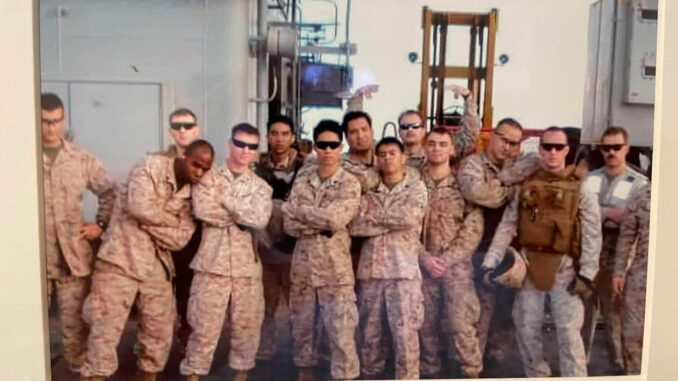
by Zachary Petroff | staff columnist
Feb. 17, 2022
The only time I find it appropriate to bring up when I served in the United States Marine Corps is when it immediately benefits me professionally…. or helps me impress a young lady on a popular dating app (the former having much more success than the latter).
There are a variety of reasons why I choose not to advertise my time in service as often as my peers tend to. I find the rabid fan base of those that blindly follow violent authoritarianism based institutions to be as off-putting, as they are naive.
While I am proud of my time serving in the world’s deadliest fraternity, I do not want my military service to define who I am as a person or have it take over my personality.
When I left the Marines after my second combat deployment, I removed myself from social media and changed my contact information. Excommunicating myself was difficult, but I thought a clean break would help me focus on the next chapter of my life as a civilian.
That was the lie I told myself.
In reality, I was facing extreme mental health issues and was ashamed that the men who I had served with would see me as a failure, or even worse, weak.
This was purely speculative and said more about me and my issues than it did about those that I served with.
There is a high level of toxic masculinity in the armed forces that tends to amplify more intensely in combat units. We were a group of young men faced with the impossible task of “defending democracy.”
Training for war means being ready to end someone’s life. It also requires one to deal with the very real possibility of dying young.
The unusual career choice hoisted on the naive, often poor and usually already mentally deteriorated youth provides an avenue for a much different and cyclical lens of the world.
These circumstances created a brotherhood out of necessity. For close to five years I would do everything with these men, most activities are not appropriate to be mentioned in a school paper at a private Catholic university. Our language was barbaric, often filled with homophobic slurs sprinkled in with an obnoxious amount of obscenities. We often smelled of Axe body spray to cover up the stench of beer and tequila from the previous night. Our eyes, bloodshot. Our diet consisted of tobacco, energy drinks, protein powder and cheap alcohol.
We walked around as if we were untouchable with a mindset that we were God’s handpicked gift to America. We were relentlessly cruel to one another, often taking conversations beyond inappropriateness.
I often refer to this as the best time of my life.
Along with the worst.
We were brothers. We had a bond that can only truly be accurately characterized as love. Our affection often through jeers and toughness shined brightest when the violence erupted. We all were willing to both take and sacrifice our lives in order to protect comrades. Some of the best men I have ever had the pleasure of serving with are not here today because of their commitment to their Marines…or struggles with mental health.
Even as I write that, I can picture my fellow jarheads rolling their eyes and crafting the rudest and most ruthless insults to hurl relentlessly at me.
There are many issues in the U.S. military that are often ignored or downplayed due to our blind nationalism that de-prioritizes accountability. Sexual assault is alarmingly rampant; The amount of hate groups in the ranks continues to increase annually in the military; suicides appear to be common among veterans.
Many of these issues stem from an oddly romanticized toxic masculinity that appears to be the driving force of the military.
We were proud to be Marines and attempted to emulate the complex lore that came with being one of the world’s elite fighting forces. Can this manufactured but necessary comradery be instilled without the need of perpetuating every facet of male-driven ego? Are our minds developed enough to fully understand the gravity of consequences from war without shredding our thin fabric from an overwhelming angst of both death and murder?
It does not seem likely.
Maybe that is why it is just easier not to bring it up.

